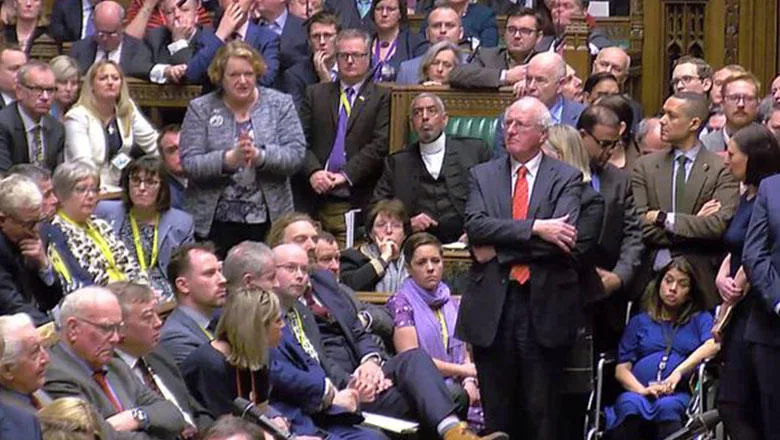“After months of demanding reform, I ended up back in the office six weeks after giving birth. I felt I had no choice”
Tulip Siddiq, Shadow Economic Secretary to the Treasury
15 February 2023
Parliament only changed its rules after I delayed giving birth to vote – and it still has a long way to go
Tulip Siddiq
It’s time to bring childcare and employment rights into the 21st century.


Tulip Siddiq is Shadow Economic Secretary to the Treasury.
This essay is taken from our new edition of Essays on Equality: The politics of childcare. Read the full collection.
As far back as I can remember, there are two things I always wanted – a baby sibling and, growing up in a politically charged family, to work in politics and make a difference. I was granted my first wish when I was eight years old and to my mother’s credit, she let me fuss, bathe, play and dress up my baby sister as much as I wanted. Years later this translated into my desire to have my own children and I’m now a happy, albeit overwhelmed, mother of two small children.
Perhaps what I didn’t really factor in is how my two childhood wishes were essentially in conflict. Caring for a small child and pursuing a hectic political career are not natural bedfellows especially in the House of Commons, somewhat ironically known as the Mother of Parliaments.
While pregnant in 2016, I tried to clarify my maternity arrangements with parliament’s authorities. To my dismay, I found that there was no baby leave for MPs and no way of casting a vote by proxy nor electronic means. Parliament was truly archaic and made no apology for it. After months of demanding reform, I ended up back in the office six weeks after giving birth. I felt I had no choice.
I developed mastitis, a painful infection of the breast, because I returned to work quickly and hadn’t properly arranged my pumping schedule. I barely saw my daughter because of late votes, which meant I relied heavily on my husband for childcare support.
Parliament was so unforgiving. Votes were often called at midnight and meetings were scheduled early in the mornings. I commonly saw MPs saying goodnight to their children on facetime from the voting lobbies. I read articles describing colleagues as “because they hadn’t turned up for a vote. In reality, they were actually giving birth.
Social media was similarly merciless, with abuse often masquerading as “political discourse”. If you missed a vote, it merely said “absent”. Parliament had no maternity leave and therefore no means of recording the fact that you had just given birth. This has had real consequences for mothers who were new MPs.
Alongside my work on Brexit, education, and constituency issues, I lobbied for changes to the backwards procedures of parliament – addressing the late-night debates and the lack of proxy voting. I received vocal pushback from MPs who were clearly resistant to change.
Approaching the birth of my second child, still nothing had changed. This time I had gestational diabetes and pregnancy complications. The doctors were bringing my C-section forward to 15 January – the same date as Parliament’s “Meaningful Vote” on Brexit.
With a very heavy heart, I took the decision to delay my caesarean. I resented having to choose between being a “good mother” and doing the job I was elected to do. I felt a natural duty to my child, but also to my 80,000 constituents in Hampstead and Kilburn, not least the 22,000 European Nationals whose future in the UK needs protecting.
I don’t know if it was the grim picture of me voting on a wheelchair or the public’s outrage at archaic rules. It’s rarely obvious why change happens in Westminster. But my decision was clearly a catalyst, with the voting rules changing almost immediately, finally allowing proxy voting for new parents.
Yet parliament still doesn’t have proper maternity leave for MPs, even though some slow progress has been made since I had my first child in 2016. I vote late most Mondays, Tuesdays and Wednesdays which means I miss bath and bedtime for the children. I still count myself lucky as I’m able to go home most nights as a London MP. It’s very common to witness MPs saying good night to their children on iPads in the voting lobbies.
On an MP’s salary, I count myself luckier than other working mothers who are shift working or in low paid jobs as well. My childcare costs per month are higher than my mortgage. And at every constituency surgery, I hear how families are bearing the brunt of the soaring cost of childcare. It’s making an already difficult cost-of-living crisis even more painful for working families in my constituency and across the country. A full-time nursery place for a child under the age of two now costs almost two-thirds of a parent’s weekly take-home pay in England and Wales, and over half the average weekly take-home pay in Scotland. Many parents, including both middle class professionals in Hampstead and families living in poverty in Kilburn, can simply not afford these extortionate prices.
This is pricing mothers – who are still most likely to be the primary care givers – out of employment. Figures from the ONS show that the number of women choosing not to work to look after their children has risen by 5% in the last year alone.
This is bad for women and devastating for the economy. An estimated 1.7 million women are prevented from taking on more hours of paid work due to childcare issues, and this is costing up to £28 billion in lost economic output every year. It has contributed to the stagnant growth that has plagued the UK economy for the last 12 years and reduced mothers’ life chances.
This hurts children too. In my previous role as Shadow Minister for Children and Early Years, I saw first-hand how the early years provision can be crucial for a child’s development. Research has shown that high quality early years education delivered by a qualified and skilled workforce is key to reducing the development gap between children from disadvantaged backgrounds and their wealthier peers. This gap will only widen as a growing number of parents are unable to access early education and childcare.
During the pandemic, Parliament went fully digital and we were allowed to vote online, conduct meetings on zoom and participate in debates virtually. It really felt like we were dragging Parliament into the 21st century. I, along with like-minded MPs, genuinely thought we were about to modernise Parliament. However, the minute the pandemic was over, senior politicians decided the new ways of working were detrimental to democracy (their conception of democracy still resembling something close to ancient Athens – a group of rowdy men all gathered in one place to vote) and suspended all virtual arrangements. We are now back to voting physically in the lobbies and missing votes when we have any form of medical condition or an emergency childcare situation. As I’m writing this essay, I’m resting in bed because of a tooth extraction and missing a vital vote on education!
“I resented having to choose between being a 'good mother' and doing the job I was elected to do”
Tulip Siddiq, Shadow Economic Secretary to the Treasury
Fighting (and sometimes winning) these battles in Westminster, while important, is just the first small step in building consensus around a new politics of motherhood. We need to win the economic argument for a fairer childcare system for parents across the country. That’s why the Labour Party has committed to delivering free breakfast clubs for every primary school age child in England. This will help get mothers back to work as well as strengthen children’s life chances by driving up standards in reading, writing and maths for the most disadvantaged.
This will lay the foundations for an ambitious mission to build a modern childcare system, which guarantees support from the end of parental leave to the end of primary school. Alongside this, we need a workplace culture that can give parents the flexibility they need to balance a career with childcare. That’s one of the reasons why 18 months ago, with the help of campaign groups like Pregnant then Screwed, I brought forward my Flexible Working Bill to give workers the right to flexible working on the first day of employment.
Our campaign has had a few successes since then. The government recently announced that it would be supporting my Labour colleague, Yasmin Qureshi’s cross-party Employment Relations Bill, which will deliver important changes such as allowing employees to make two flexible working requests in any 12-month period.
I tabled an amendment to the Bill to give employees the right to request flexibility from the first day of the job, rather than having to wait a ridiculous 26 weeks as set out under the current legislation. So much can happen in a woman’s life – or anyone’s life – in 26 weeks! I was delighted that Minsters finally listened and committed to introducing the day one right to request flexible working.
I have been supporting Labour MP Dan Jarvis’s successful Private Members Bill which will make it harder for employers to make pregnant women and new mothers redundant.
While these are welcome steps forward, we need to go much further if we are going to make flexible working the default. That’s why Labour has committed to build on these successes by making flexible working a genuine right for all from day one of employment, and our New Deal for Working People would make it unlawful to dismiss a woman who is pregnant, including six months after her return.
It’s time to bring childcare and employment rights into the 21st Century. Mothers and children deserve nothing less.
